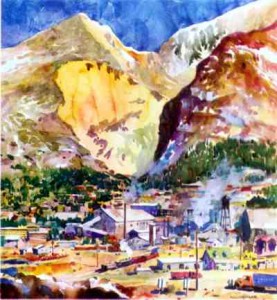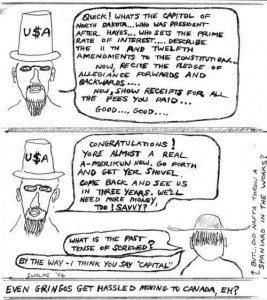Review by Marcia Darnell
Radiation – June 2006 – Colorado Central Magazine
Folding Paper Cranes
by Leonard Bird
Published in 2005 by University of Utah Press
ISBN: 0-87480-824-3
IN A NUCLEAR WAR, are we all victims, or are we all perpetrators? Or both?
Leonard Bird has spent his life trying to resolve his own guilt in the U.S. military’s use of nuclear weapons. As a 18-year-old Marine, he saw Hiroshima just a few years after the devastation wrought by Little Boy. The citizens’ dedication to building the International Peace Park seemed meaningless to him at the time — why didn’t they focus on building houses first?
Strolling through the city, he was unsettled by the palpable hatred he felt from the Japanese people he saw trying to rebuild their lives.
Three years later, he understood more — after his unit was tapped for exposure to a nuclear test in the Nevada desert. The men crouched in a five-foot trench while Shot Hood was detonated. Then they were ordered to stand and look into the mushroom cloud. Then they were marched through the fallout, past destroyed vehicles, flattened buildings, and torn animals. Bird writes:
Gas masks still in place and taking shallow, frightened breaths, the battalion wriggles from the trenches just as the pale sun, not quite obscured by a gray scrim of atomic dust, rises above a low line of barely visible hills.
As my head rises above the trench, my groping hand touches a bleeding mourning dove, its feathers blasted by the heat…. Melted eyes ooze gray pus, and from the throat of this scorched, twitching dove bubbles nothing but a faint “sqwick sqwick sqwick.”
It changed Leonard Bird, body and psyche.
A high school dropout, Bird went back to school, earning an advanced degree and becoming an instructor in literature at Fort Lewis College. Physically, the exposure made him sterile, and later in life, gave him cancer.
He has made two more trips to Hiroshima, seeking answers and finding more questions. On each journey he still felt ostracized by the Japanese people around him, but he also encountered individuals who reached out to him, talked to him, and recognized him as a fellow seeker of peace. In his words:
When I first visited the Peace Park in 1954, I failed to grasp its premise or its vision. I was a high school dropout, and eighteen-year-old Marine dragged along to Hiroshima by an older and wiser buddy. Not until the months following my own nuclear apotheosis at Yucca Flat three years later did I even begin to glimpse the import of what I had encountered in Hiroshima.
In June of 1981, twenty-four years after Yucca Flat and Shot Hood, I finally made my first trip back, accompanied by Jane. From that visit I developed great respect for the Peace Park and its vision. Sad to say, that respect was more than balanced by my own despair and a deeply etched fear of approaching nuclear Armageddon. Not until 1993 and my third visit did I fully grasp the Hibakusha’s vision and feel their tenuous but abiding hope.
Folding Paper Cranes is a beautiful book, composed of poems, prose, and a few drawings created by Bird’s wife, Jane. The words flow, even as the passages shift through different times in the author’s life. His recollection of healing while watching the desert wildlife outside his hospital window during cancer treatment is quietly inspiring.
In the last section of the book, the author describes each memorial in the Peace Park, its history and purpose, and how each is honored by the people who visit Hiroshima. His account is more than a guidebook, though, evoking both smiles and tears. Bird’s search for understanding, for forgiveness, for peace, is a never-ending quest.
This book evokes terror, outrage, fear, disgust, compassion, pity, and finally, hope. Would that we all could make that journey.


